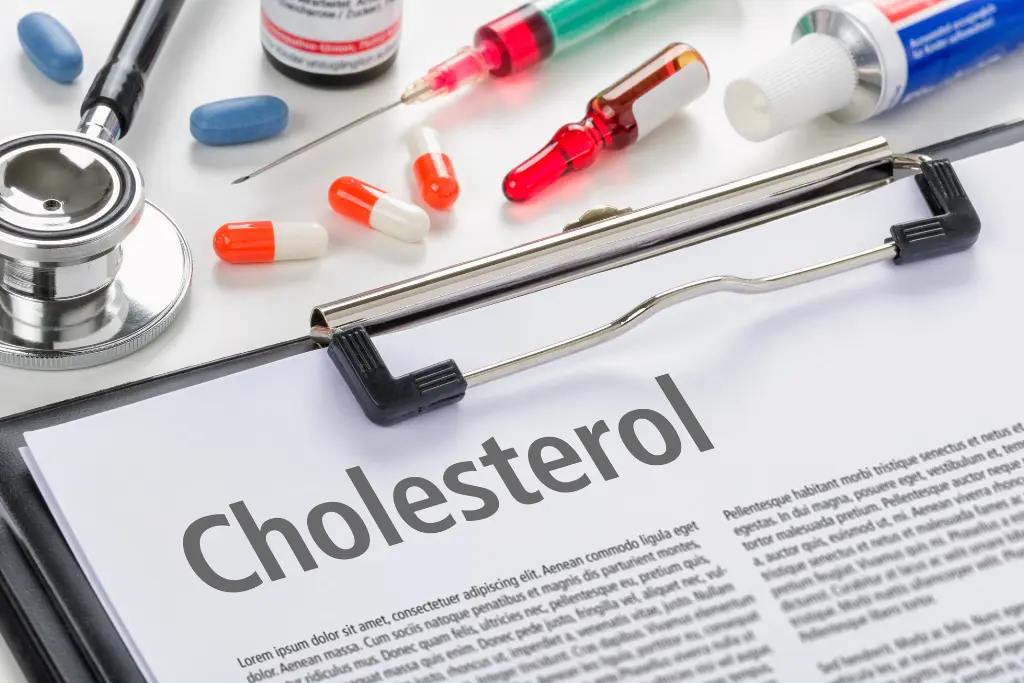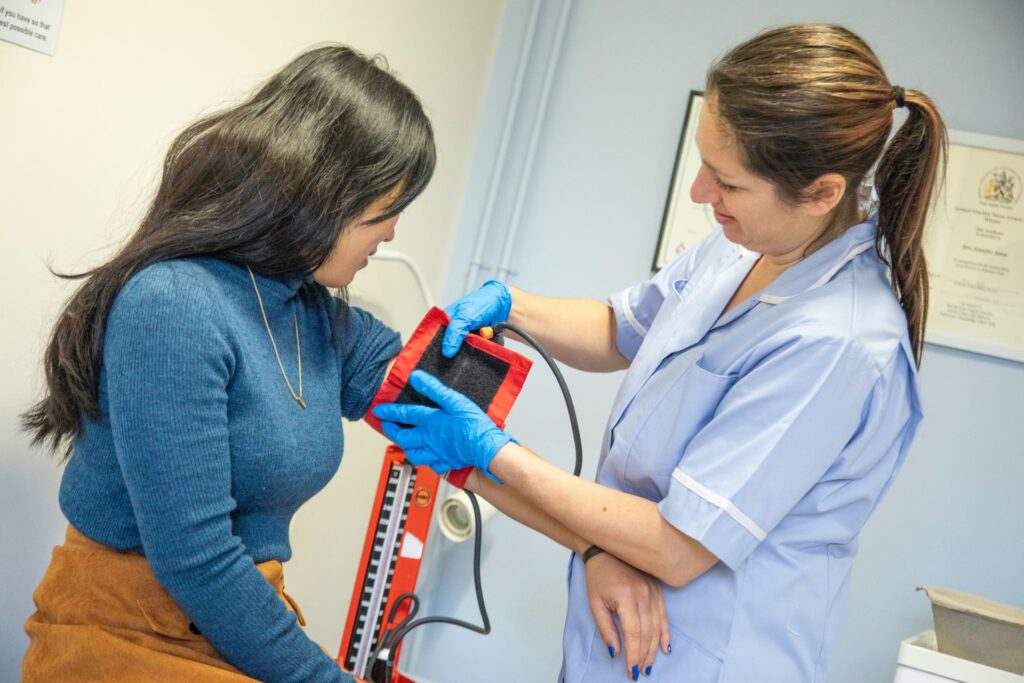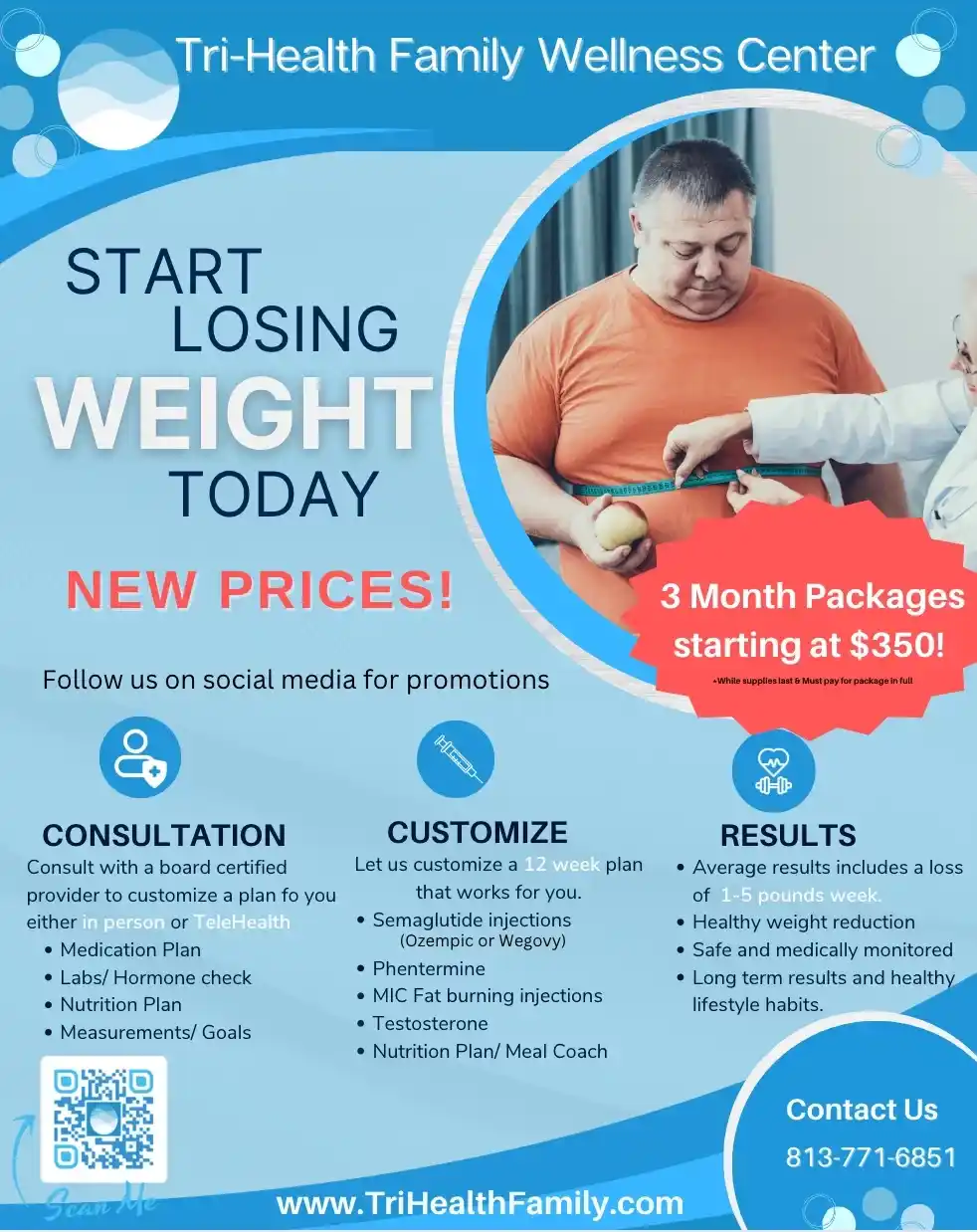Tri Health Family Wellness Center
Healthy Fats vs. Unhealthy Fats: Navigating the Cholesterol Minefield
Have you heard that some fats are good for you and others aren’t?
It can be confusing! Fat has gotten a bad rap over the years, but the truth is, our bodies actually need healthy fats to function properly.
This article will clear up the confusion about fat and cholesterol, helping you understand how they affect your heart health.

By the end, you’ll know how to make smart choices about the fats you eat and keep your heart happy.
We’ll also introduce Tri-Health Family Wellness Center, a trusted healthcare provider in Wesley Chapel, Florida, here to guide you on your journey to a healthier heart.
The Truth About Fats: Not All Fats Are Created Equal
Forget everything you thought about fat! Not all fats are bad. Just like cars need different types of gas, our bodies need different fats. Some fats are like premium fuel, good for your heart and keeping you energized.
Others are more like low-grade fuel, not very helpful and maybe even causing issues. We’ll break down the good fats from the not-so-good ones next.
Saturated And Unsaturated Fats: Understanding The Difference
Saturated Fats: These come from animal sources like red meat, full-fat dairy products, and some plant-based oils (coconut and palm oil). While our bodies need some saturated fat, too much can raise bad cholesterol and increase the risk of heart problems. Think of them as characters you want to keep in moderation, like a supporting actor in a movie, not the main star.
Unsaturated Fats: Now for the good guys! Unsaturated fats are the superheroes for your heart. They come in two forms:
- Monounsaturated Fats (MUFAs): Found in delicious foods like olive oil, avocado, nuts (almonds, cashews), and seeds. MUFAs lower bad cholesterol and promote good cholesterol, keeping your heart happy.
- Polyunsaturated Fats (PUFAs): Think of fatty fish (salmon, tuna), walnuts, flaxseeds, and sunflower seeds. PUFAs also lower bad cholesterol and offer additional benefits like reducing inflammation.
Understanding Cholesterol: What It Is And Why It Matters
Fat isn’t the only player in the heart health game. Cholesterol, a waxy substance produced by your liver and found in certain foods, also plays a crucial role.

But here’s the thing: cholesterol itself isn’t inherently bad. It’s actually essential for building healthy cells, aiding digestion, and even hormone production. However, the type and amount of cholesterol circulating in your blood significantly impact your cardiovascular health.
Here’s a breakdown of the two main types of cholesterol and their influence on your heart:
Low-Density Lipoprotein (LDL) Cholesterol:
Often referred to as “bad” cholesterol, LDL particles are like sticky villains. They tend to build up on the inner walls of your arteries, forming plaque. Over time, this plaque buildup can narrow your arteries, a condition known as atherosclerosis. This narrowing restricts blood flow to your heart, increasing your risk of heart attack and stroke.
High-Density Lipoprotein (HDL) Cholesterol:
HDL, the “good” cholesterol, acts like a hero. It picks up excess LDL cholesterol from your arteries and transports it back to your liver for disposal. This helps keep your arteries clear and reduces the risk of plaque buildup.
Does Your Body Make Its Own Cholesterol?
Yes! Your liver is a mighty factory, and one of its jobs is to produce cholesterol. This cholesterol is essential for various bodily functions.

However, dietary cholesterol, found in animal products like meat and eggs, also contributes to your total blood cholesterol level.
Keeping Your Cholesterol In Check: What You Can Do
Now that we understand the importance of balancing “good” and “bad” cholesterol for a healthy heart, let’s explore actionable steps you can take to manage your cholesterol levels:
Dietary Choices:
- Embrace Unsaturated Fats: As discussed earlier, swapping saturated fats for unsaturated fats like olive oil, avocados, nuts, and fatty fish is a powerful strategy. These heart-healthy fats can help lower LDL cholesterol and potentially raise HDL cholesterol.
- Limit Saturated and Trans Fats: Minimize your intake of saturated fats found in fatty cuts of red meat, full-fat dairy products, and some plant oils (coconut and palm oil). Completely eliminate trans fats, typically found in processed fried foods and baked goods made with partially hydrogenated oils. These fats significantly increase LDL cholesterol and pose a major threat to heart health.
- Fibre Up: Soluble fiber, found in oatmeal, beans, lentils, fruits, and vegetables, acts like a sponge in your digestive system. It traps cholesterol and helps eliminate it from your body, promoting lower LDL levels.
- Fruits and Veggies: Don’t forget the power of colorful fruits and vegetables! They’re packed with essential vitamins, minerals, and antioxidants that contribute to overall heart health.
Lifestyle Habits:
- Get Moving: Regular physical activity, even moderate exercise for 30 minutes most days of the week, works wonders for your heart. Exercise helps lower LDL cholesterol and raise HDL cholesterol, creating a win-win situation.
- Maintain a Healthy Weight: Obesity is a significant risk factor for high cholesterol. Losing weight, even a modest amount, can significantly improve your cholesterol profile.
- Manage Stress: Chronic stress can contribute to unhealthy lifestyle choices and potentially elevate your LDL cholesterol levels. Find healthy ways to manage stress, such as yoga, meditation, or spending time in nature.
- Don’t Smoke: Smoking is a major risk factor for heart disease and negatively impacts your cholesterol levels. Quitting smoking is one of the most important steps you can take for your cardiovascular health.
Working With Your Doctor:
Regular checkups with your doctor are crucial for monitoring your cholesterol levels.

Based on your risk factors and cholesterol readings, your doctor may recommend additional strategies, potentially including medication, to manage your cholesterol and optimize your heart health.
Tri-Health Family Wellness Center: Your Partner In Heart Health
Tri-Health Family Wellness Center in Wesley Chapel, Florida, is dedicated to helping you achieve a healthier heart. We provide thorough health assessments, including cholesterol level checks, and personalized guidance on managing cholesterol through lifestyle changes and, if necessary, medication management.
Final Thoughts
Throughout the article we’ve covered, you’ve picked up some valuable tips about fats and cholesterol, discovering the secrets to a heart-healthy lifestyle. Remember, you have the power to make choices that boost your well-being.
The main takeaways are simple: go for the good stuff (unsaturated fats), cut back on the troublemakers (saturated and trans fats), and focus on a balanced diet with lots of fiber and colorful fruits and veggies. And remember the importance of regular exercise, managing stress, and keeping a healthy weight. Most importantly, team up with your doctor for regular checkups and personalized guidance.
At Tri-Health Family Wellness Center in Wesley Chapel, Florida, we’re committed to being your partner on this journey. We provide thorough health assessments, including cholesterol level checks, and work with you to create a personalized plan for a heart-healthy future.
Don’t wait! Take charge of your health today. Schedule a checkup with Tri-Health Family Wellness Center. Call us at 813-771-6851 or visit our website at https://trihealthfamily.com/services/ to learn more and start your journey to a vibrant, heart-filled life.



